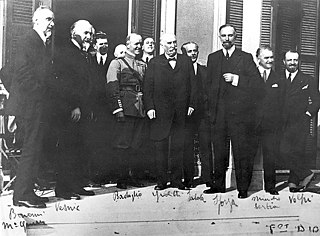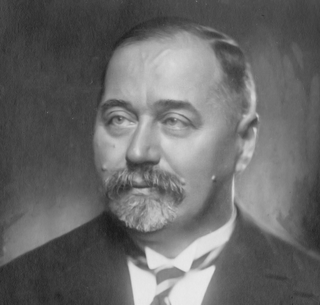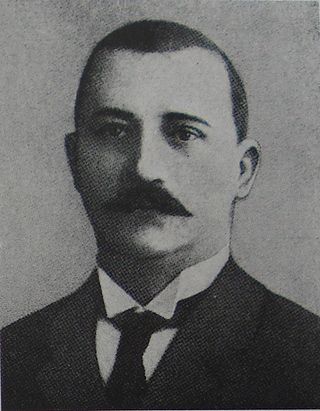Related Research Articles

The Treaty of Rapallo was an agreement between the Kingdom of Italy and the Kingdom of Serbs, Croats and Slovenes in the aftermath of the First World War. It was intended to settle the Adriatic question, which referred to Italian claims over territories promised to the country in return for its entry into the war against Austria-Hungary, claims that were made on the basis of the 1915 Treaty of London. The wartime pact promised Italy large areas of the eastern Adriatic. The treaty, signed on 12 November 1920 in Rapallo, Italy, generally redeemed the promises of territorial gains in the former Austrian Littoral by awarding Italy territories generally corresponding to the peninsula of Istria and the former Princely County of Gorizia and Gradisca, with the addition of the Snežnik Plateau, in addition to what was promised by the London treaty. The articles regarding Dalmatia were largely ignored. Instead, in Dalmatia, Italy received the city of Zadar and several islands. Other provisions of the treaty contained safeguards for the rights of Italian nationals remaining in the Kingdom of Serbs, Croats and Slovenes, and provisions for commissions to demarcate the new border, and facilitate economic and educational cooperation. The treaty also established the Free State of Fiume, the city-state consisting of the former Austro-Hungarian Corpus separatum that consisted of Rijeka and a strip of coast giving the new state a land border with Italy at Istria.

The State of Slovenes, Croats and Serbs was a political entity that was constituted in October 1918, at the end of World War I, by Slovenes, Croats and Serbs (Prečani) residing in what were the southernmost parts of the Austro-Hungarian Empire. Although internationally unrecognised, this was the first incarnation of a Yugoslav state founded on the Pan-Slavic ideology. Thirty-three days after it was proclaimed, the state joined the Kingdom of Serbia to form the Kingdom of Serbs, Croats and Slovenes.

Stjepan Radić was a Croat politician and founder of the Croatian People's Peasant Party (HPSS), active in Austria-Hungary and the Kingdom of Serbs, Croats and Slovenes.
The State of Slovenes, Croats and Serbs became merged with the Kingdom of Serbia and the Kingdom of Montenegro to form the nation of Yugoslavia in 1918. The formation of Yugoslavia began with the formation of the Yugoslav Committee, a collection of mostly Croats, then Serbs and later Slovenes, whose goal was to form a single south Slavic state. In October 1918 the Croatian Parliament declared the Kingdom of Croatia-Slavonia as an independent state, which, in December that same year, incorporated into the State of Slovenes, Croats and Serbs, merged with Kingdom of Serbia and Kingdom of Montenegro and created the Kingdom of Serbs, Croats and Slovenes. The kingdom would be renamed to Yugoslavia in 1929, and ruled by Serbian Karađorđević dynasty till Second World War. After the formation of Yugoslavia, Serbia attempted to create a "Greater Serbia" by using police intimidation and vote rigging to establish a Serbian controlled Yugoslavia. From 1929-1941 Serbian controlled Yugoslavia established control over Croatia through Royal Yugoslav police force brutality and assassinations of important Croatians.

The Yugoslav Committee was a World War I-era, unelected, ad-hoc committee that largely consisting of émigré Croat, Slovene, and Bosnian Serb politicians and political activists, whose aim was the detachment of Austro-Hungarian lands inhabited by South Slavs and unification of those lands with the Kingdom of Serbia. The group was formally established in 1915 and it last met in 1919, shortly after the breakup of Austria-Hungary and the establishment of the Kingdom of Serbs, Croats and Slovenes, which was later renamed Yugoslavia. The Yugoslav Committee was led by its president the Croat lawyer Ante Trumbić and, until 1916, by Croat politician Frano Supilo as its vice president.

Ante Trumbić was a Yugoslav and Croatian lawyer and politician in the early 20th century.

Svetozar Pribićević was a Croatian Serb politician in Austria-Hungary and later Kingdom of Yugoslavia. He was one of the main proponents of Yugoslavism and a federalized South Slavic state which would later turn out to be Yugoslavia. However, he later became a bitter opponent of the same policy that was promoted by King Alexander I.

The Kingdom of Croatia-Slavonia was a nominally autonomous kingdom and constitutionally defined separate political nation within the Austro-Hungarian Empire. It was created in 1868 by merging the kingdoms of Croatia and Slavonia following the Croatian–Hungarian Settlement of 1868. It was associated with the Kingdom of Hungary within the dual Austro-Hungarian state, being within the Lands of the Crown of St. Stephen, also known as Transleithania. While Croatia had been granted a wide internal autonomy with "national features", in reality, Croatian control over key issues such as tax and military issues was minimal and hampered by Hungary. It was internally officially referred to as the Triune Kingdom of Croatia, Slavonia and Dalmatia, also simply known as the Triune Kingdom, and had claims on Dalmatia, which was administered separately by the Austrian Cisleithania. The city of Rijeka, following a disputed section in the 1868 Settlement known as the Rijeka Addendum, became a corpus separatum and was legally owned by Hungary, but administered by both Croatia and Hungary.

Frano Supilo was a Croatian politician and journalist. He opposed the Austro-Hungarian domination of Europe prior to World War I. He participated in the debates leading to the formation of Yugoslavia as a member of the Yugoslav Committee. The author, R. A. Stradling, calls him "one of the most capable Croatian politicians ever."

Nikola Mandić was a Croatian politician and one of the leading political figures in Bosnia and Herzegovina under Austrian-Hungarian rule. He also served as a Prime Minister of the Independent State of Croatia (NDH) during World War II. He was executed by the Yugoslav Partisans as a war criminal on 7 June 1945.

Yugoslavia was a state concept among the South Slavic intelligentsia and later popular masses from the 19th to early 20th centuries that culminated in its realization after the 1918 collapse of Austria-Hungary at the end of World War I and the formation of the Kingdom of Serbs, Croats and Slovenes. However, from as early as 1922 onward, the kingdom was better known colloquially as Yugoslavia ; in 1929 the name was made official when the country was formally renamed the "Kingdom of Yugoslavia".
The Temporary National Representation, also the Interim National Legislation and the Interim National Parliament, was the first legislative body established in the Kingdom of Serbs, Croats and Slovenes. It was created by the decree of Prince Regent Alexander on 24 February 1919, and convened on 1 March. Its 294 members were appointed by various provincial and regional assemblies or commissions. The main product of its work was the act regulating the election of the Constitutional Assembly. The body's work ceased after the election held on 28 November 1920.
The Croat-Serb Coalition was a major political alliance in Austria-Hungary during early 20th century that governed the Croatian lands, the crownlands of Croatia-Slavonia and Dalmatia. It represented the political idea of a cooperation of Croats and Serbs in Austria-Hungary for mutual benefit. Its main leaders were, at first Frano Supilo and Svetozar Pribićević, then Pribićević alone.

The May Declaration was a manifesto of political demands for unification of South Slav-inhabited territories within Austria-Hungary put forward to the Imperial Council in Vienna on 30 May 1917. It was authored by Anton Korošec, the leader of the Slovene People's Party. The document was signed by Korošec and thirty-two other council delegates representing South-Slavic lands within the Cisleithanian part of the dual monarchy – the Slovene Lands, the Dalmatia, Istria, and the Condominium of Bosnia and Herzegovina. The delegates who signed the declaration were known as the Yugoslav Club.

The Lipošćak affair was an alleged conspiracy led by the former Austro-Hungarian Army General of the Infantry Anton Lipošćak to seize power in the recently proclaimed State of Slovenes, Croats and Serbs at the end of the First World War. The majority view of the allegations is that they were fabricated by allies of the Croat-Serb Coalition leader Svetozar Pribičević. Lipošćak was arrested on 22 November 1918 under suspicion of treason. He was accused of plotting to establish councils composed of workers, peasants and soldiers in place of the existing authorities with the aim of reviving the Habsburg monarchy, or working on behalf of foreign powers or the Bolsheviks.

The Geneva Declaration, Geneva Agreement, or Geneva Pact was a statement of political agreement on the provisional political system in the future union of the South Slavs living in the territories of the former Austro-Hungarian Empire and Kingdom of Serbia. It was agreed by Serbian Prime Minister Nikola Pašić on behalf of Serbia, representatives of Serbian parliamentary opposition, representatives of the National Council of the State of Slovenes, Croats and Serbs which recently seceded from Austria-Hungary, and representatives of the Yugoslav Committee. The talks held in Geneva, Switzerland on 6–9 November 1918 built upon and were intended to supersede the 1917 Corfu Declaration agreed by Pašić and Yugoslav Committee president Ante Trumbić. The basis for the talks was provided by the Greek Prime Minister Eleftherios Venizelos on behalf of the Supreme War Council of the Triple Entente. The talks were necessary in the process of creation of Yugoslavia as a means to demonstrate to the Entente powers that various governments and interests groups could cooperate on the project to establish a viable state.
The Zagreb Resolution was a political declaration on the need for political unification of the Croats, the Slovenes and the Serbs living in Austria-Hungary. It was adopted by representatives of opposition political parties in the Kingdom of Croatia-Slavonia presided by Ante Pavelić in a meeting held in Zagreb on 2–3 March 1918. The declaration relied on the right of self-determination and called for establishment of an independent democratic state respecting rights of individuals and historically established polities joining the political union. It also called for ensuring cultural and religious equality in such a union. The Zagreb Resolution established a preparatory committee tasked with establishment of the National Council of Slovenes, Croats and Serbs intended to implement the resolution. The National Council was established on 5 October in proceedings described by Pavelić as a continuation of the Zagreb conference that March.
Mate Drinković was a physician and Croatian and Yugoslavian politician. He graduated from the University of Graz obtaining a degree in medicine before practising in Ston, Vodice, and Šibenik. Drinković was a supporter of the Party of Rights and became a member of the leadership of the party's Dalmatian chapter in 1908. In the 1908 Dalmatian parliamentary election, he was elected a member of the Diet of Dalmatia on the Party of Rights ticket. Drinković supported the Rijeka Resolution calling on the unification of the Kingdom of Croatia-Slavonia and Dalmatia. He also advocated for the dissolution of Austria-Hungary and the creation of a common South-Slavic state. This led to Drinković's arrest, trial, and conviction of treason in 1914. He was imprisoned until a general amnesty in 1917. A year later, Drinković took part in the establishment of the short-lived State of Slovenes, Croats and Serbs carved out of Austria-Hungary at the conclusion of the World War I. He was a member of the central committee of the National Council, and national defence commissioner of the new state. In the latter capacity, Drinković took part in organisation of 1918 occupation of Međimurje resulting in the addition of Međimurje region to the newly formed Kingdom of Serbs, Croats and Slovenes. He was a member of the National Council's delegation sent to Belgrade to arrange establishment of the new South-Slavic state through the unification of the State of Slovenes, Croats and Serbs with the Kingdom of Serbia.

Franko Potočnjak was a lawyer and Croatian and Yugoslavian politician. Potočnjak graduated in law from the University of Zagreb and worked as a court clerk until 1887 when he opened a law office in the town of Sveti Ivan Zelina. He joined the Party of Rights and he was editor of its journal Hrvatska domovina n 1896–1897. Potočnjak successfully advocated a coalition of the Independent People's Party and the faction of the Party of Rights led by Fran Folnegović. He was elected to the Croatian Sabor as the Party of Rights candidate in the 1897 Croatian parliamentary election in the district of Bakar. However, he was excluded from Sabor meetings due to his criticism of the Ban of Croatia Károly Khuen-Héderváry. He was elected to the Croatian Sabor again in the 1906 Croatian parliamentary election and delegated as a representative to the Diet of Hungary in 1906–1907.

Jovan Banjanin (1874–1960) was a Croatian Serb and Yugoslavian politician.
References
- ↑ "Srkulj, Stjepan". Hrvatska enciklopedija, mrežno izdanje (in Croatian). Miroslav Krleža Institute of Lexicography . Retrieved 5 July 2024.